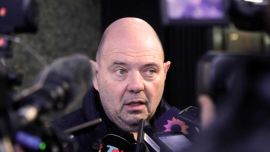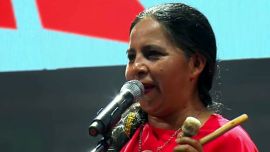Argentina is a politically divided nation, but there are many ways of looking at its notorious divisions. The country is ruled by the centre-left Peronist coalition and the opposition is headed by a centre-right coalition. It sounds straightforward enough, but coalitions are never simple. The question, always, is if they will stick together when the going gets rough.
At present, Juntos por el Cambio, is clearly divided between those who are stoking a hawkish opposition and those in office, like Buenos Aires City Mayor Horacio Rodríguez Larreta, who show moderation. The risk for the opposition is that at some point the coalition will likely crumble due to disagreements between the agitators (headed by former president Mauricio Macri and former security minister Patricia Bullrich) and the moderates.
But now, look again. The ruling coalition, Frente de Todos, is suddenly hit by turbulence too. Stoking dissent this week was Argentina's vote on Tuesday at the United Nations Human Rights Council condemning the human rights situation in Venezuela. In a shift in its diplomatic stance, Argentina was one of 22 nations to condemn ''the widespread targeted repression and persecution on political grounds'' in the crisis-stricken country. The vote came days after Argentina's ambassador to the Organisation of American States (OAS) had baulked at calling Venezuela a dictatorship. Tuesday's UN vote outraged members from Frente de Todos’ Kirchnerite wing. Bolivarian Venezuela was a staunch ally of late president Néstor Kirchner. After the UN vote, Alicia Castro announced that she was stepping down as Argentina's nominated ambassador to Russia. Castro is a former ambassador to Venezuela and the United Kingdom during previous Kirchnerite administrations. Her appointment to Russia was snarled by the pandemic and Senate approval was still pending.
President Alberto Fernández reportedly decided to change Argentina's stance on Venezuela, despite the complaints. Venezuela has now divided his coalition. Lower House Speaker Sergio Massa, a moderate, recently did not hesitate in calling Venezuela a dictatorship. His dissent could be a sign that he is planning ahead with a political future in mind should the coalition eventually fall apart. No such thing has happened just yet, but subtle differences are also emerging over the Supreme Court's decision to accept a complaint by three judges against a Senate vote. The Peronist-controlled Senate rejected a decision decreed by Macri when president to move the three judges to other courts.
The Senate is headed by Vice-President Cristina Fernández de Kirchner, the leader of the powerful Kirchnerite wing. The five-person Supreme Court accepted the complaint by the three judges who argue they have been targeted because they have been involved in the handling of corruption cases against the former president. One Kirchnerite lawmaker has now called for the impeachment of Supreme Court Chief Justice Carlos Rosenkrantz (appointed during the Macri presidency) over his votes in cases involving suspects of crimes against humanity committed during the last military dictatorship. Justice Ministry officials on Thursday rejected an invitation by Rosenkrantz to meet to discuss ways of moving forward quicker with human rights cases. Another Kirchnerite lawmaker rubbished the Supreme Court in general saying that it was time for a major reshuffle. The president, according to reports, is not endorsing the drive to impeach the Supreme Court chief justice even though he publicly criticised him over the case of the three judges. A crucial note: Frente de Todos does not have the majority required in Congress to effectively impeach Rosenkrantz.
It’s too early to tell if this stress will snowball into a breakdown leading to, say, a sweeping Cabinet reshuffle sponsored by the Kirchnerites, forcing out members of the president's inner circle. But Frente de Todos is in a state of internal debate over Venezuela and the Supreme Court. Speculation is rife that the president tried to convince Castro not to quit and that he will telephone Venezuelan President Nicolás Maduro to explain the UN vote. Up until now, there has been no such phone call. Foreign Minister Felipe Solá is also a moderate who in the past has often been at odds with the Kirchnerite wing. United Nation votes are abstract affairs, but Argentina could have abstained like Mexico, instead of siding with the United States and its current regional allies (Brazil, Chile and Colombia).
Argentina could be treading carefully on the diplomatic front because it does not want to trigger the ire of Washington, presumably because it is in talks to negotiate a new financing programme with the International Monetary Fund (IMF). An IMF mission visited Argentina this week and the Fund's leaders say they will not demand extreme belt-tightening policies from a country hit by a recession and now by a pandemic. Economy Minister Martin Guzmán has also ruled out going down the road of austerity.
The government is dealing with a major dollar shortage by further tightening foreign currency exchange controls. The Fernández administration is also offering temporary breaks on export duties in a bid to boost dwindling reserves. Venezuela sounds like a distant issue to the average citizen here. But there's nothing closer to home than the potential crisis that could be unleashed if the peso weakens further and inflation, poverty and unemployment continue to grow.
Much will be revealed by the result of next year's midterm elections. Ruling parties don't usually lose the midterms two years after taking office, but Fernández is under pressure now that his approval ratings, extraordinarily high when he was perceived as a consensus builder, are now falling. The opposition meanwhile has called an anti-government demonstration for October 12 (a national holiday), despite the grumbling by the moderates.



















Comments